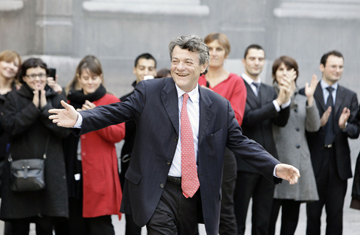
Outgoing Ecology Minister Jean-Louis Borloo gestures during the handover ceremony at the Ecology Ministry in Paris on Monday, Nov. 15, 2010
French President Nicolas Sarkozy signaled the start of his 2012 re-election drive on Sunday night, Nov. 14, with a Cabinet shuffle designed to solidify the support of conservative politicians and voters. The problem with the move, however, isn't only that it may alienate backers of departing centrist leaders. Given the considerable hype over what was billed as a big shake-up, Sarkozy's mere strategic fine-tuning of his government risks making France's seriously disgruntled public feel that the President either isn't paying attention to its complaints — or just doesn't care.
Sarkozy's appointment of a new, more rightist Cabinet came just 24 hours after conservative Prime Minister François Fillon handed in the resignation of his government to pave the way for the shuffle. It also came just four days after Sarkozy signed into law the controversial pension reform that had led to two months of strikes and protests and dragged his approval ratings to a record low of 26%. Public unhappiness over the pension initiative — combined with various government scandals and divisive security measures like the forced deportation of thousands of Roma — had created high expectations among pundits that Sarkozy would use the long-awaited transition to show that he had gotten the message by naming a Premier and Cabinet with a less reformist, more socially attentive agenda.
Instead, the new team is mostly made up of officials from the previous government. It's rounded out by senior members of Sarkozy's Union for a Popular Majority (UMP), replacing most of the centrists and leftists who were brought to government under the President's policy of "opening" to all political horizons. Gone are recruits from the left like Foreign Affairs Minister Bernard Kouchner and Fadela Amara, a Secretary of State who was responsible for improving conditions in France's blighted suburban housing projects. Also leaving are UMP members Rama Yade — who was born in Senegal and, at 33 years old, was both the right's leading symbol of diversity and one of France's most popular politicians — and Labor Minister Eric Woerth, who led the pension-reform push despite being dogged by allegations of conflict of interest arising from the complex scandal surrounding L'Oréal heiress Liliane Bettencourt. New arrivals to the Cabinet are former Prime Minister Alain Juppé as Defense Minister, UMP general secretary Xavier Bertrand as Labor and Health Minister and razor-tongued UMP spokesman Frédéric Levèbvre as Secretary of State for Trade.
Two other noteworthy departures are those of Defense Minister Hervé Morin and Ecology Minister Jean-Louis Borloo, a popular, socially attentive politician who'd long been favored to succeed Fillon as Premier. But after Sarkozy reportedly changed his mind in the week before the shuffle by opting to keep Fillon in the position, a jilted Borloo declined the alternative ministerial posts offered him and instead decided to reclaim his "freedom" outside the government. Many observers believe it opens up the possibility that Borloo may try to rally other centrists to complicate Sarkozy's 2012 re-election bid, which some claim was the motivation behind the shuffle in the first place. "I was waiting for a unifying gesture in the creation of [the new] government," Morin told journalists Sunday night, confirming suspicions that he'd lose his post after long resisting pressure from Sarkozy to renounce his plans to make a 2012 presidential bid on the centrist ticket. "Instead, I see a campaign team — I might even say the electoral team of the UMP."
"A mountain of communication has given birth to a political mouse," mused Libération editor Laurent Joffrin in his Monday editorial, using Aesopian language to reflect the general reaction in France that Sarkozy hadn't delivered the big changes he'd indicated the shuffle would bring.
Given his deep unpopularity just 18 months before the 2012 elections, why did Sarkozy veer right rather than to the center? Because with 48% approval, Fillon remains a relatively popular leader with voters (as does Borloo, who has similar or even higher ratings). A new poll asking people whom they would like to see assume a greater political role in the future landed Fillon first among conservative officials with 53% — better than Borloo's score of 44% and well ahead of Sarkozy's 35%, which put the President in sixth place. Meanwhile, most UMP officials and members, along with many traditional conservative voters, backed Fillon over Borloo — and Sarkozy needs the support of those groups to have any hope of re-election.
But Sarkozy's political calculations to the right carry a heavy risk. New polls on Monday show that 81% of voters want him and his new government to make responding to public concerns their priority. And 69% want the President to start initiating more socially minded policies — a direct contrast to the austerity measures he and Fillon say they're preparing more of. Meaning that while it may make good sense from a conservative political perspective, going with even more of the same could wind up pushing Sarkozy's already plummeting approval numbers even further down.
